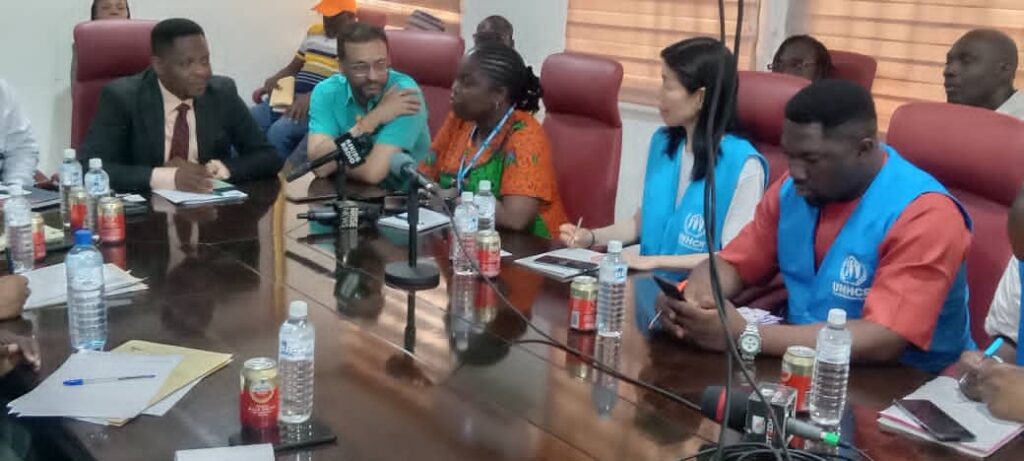By Titus Atondu Makurdi
Benue Investment Property Company Limited (BIPC) has unveiled a business model to reintegrate Internally Displaced Persons (IDPs), Refugees and Returnees into the society and ensure their self-reliance.
The company is also seeking the partnership of United Nations Refugee Commission, (UNHCR) requesting for the sum of $500M USD grant to further expand its businesses.
The BIPC Managing Director , Dr Raymond Asemakaha, made the request on Wednesday when he received the team from UNHCR in his Makurdi office.
According to him, the grant must not necessarily be cash but technical assistance to enable the company expand its scope to create about 30 business.
In a concept note he presented to the UN, tagged “Reintegration of Internally Displaced Persons (IDPs) Through Capacity-Building Initiatives to Promote Self-Reliance and Sustainability”, Asemakaha explained that part of the objectives of the programme is to take up 45 percent of IDPs, Refugees and Returnees and absorb them into the business ecosystem of the BIPC.
“To reintegrate 45% of IDPs, Refugees and Returnees
back into the society, build their capacity to become self-sufficient and independent citizens and to fully address the root causes of displacement in Benue State before the end of 2028.”
“We feel that giving the IDPs money is not the only way to help them. We want a long lasting solutions, we want to bring them to the ecosystem that when we are employing for jobs, we would give the UN 15 percent of what we do.
“We just launched our bread and water factory, as well as our fertilizer company. We are bringing them on board to learn the job and become self reliant so they don’t rely on UN on monthly basis. We want them to be able to pay their bill and to live a happy life.” The MD explained.
He further explained that the programmes targets 1.5million IDPs, 12,000 Refugees, 6,000 Returnees aged between 18 to 45 years and would be located in LGAs with the highest concentrations of IDPs in the State including Guma, Kwande, Makurdi, Agatu and Logo.
“The program would offer a comprehensive approach to empower, integrate IDPs, Refugees and Returnees in Benue State. The framework to be referred to as Integration Model would be employed to achieve the set-out objectives.” MD said.
According to him, the registration and assessment of the IDP would be carried out to identify their unique skills, educational background, and work experience after which they will receive vocational training in high-demand fields like technology, healthcare, and construction to enhance their employability and open their doors to new opportunities.
“By designating 15% of micro-employment opportunities specifically for IDPs through the BIPC, the program provides
them with immediate income generation and valuable work experience.”
“In order to further absorb the individuals into the commercial sector of the state, the company requires $500M USD grant for further expansion of its businesses; bakeries, manufacturing companies, packaging and branding firms are amongst the initiative’s currency being thought
out that would require skilled and unskilled labour for implementation.
“Provision of the fund by the Mission would see a gradual transition of requiring humanitarian aid to full self-sufficiency,” Asemakaha noted.
Responding, the UNHCR Country Representative, Arjun Jain ant the Head of UNHCR Sub Office, Ogoja, Irene Omondi, in their separate remarks described the programme as a welcome development.
Jain said he was happy that there are people in Benue who want to find solution to the issues affecting the IDP.
Sharing their experience with IDPs at the various camps visited, the country Representative noted that the occupants stated categorically that they are farmers and that they want to go back home for their own dignity, to tend to their farms and take care of their families.
While lamenting that some of the camps he visited in the state were the worst he has ever seen, Jain said after six years, people shouldn’t be seen staying in shelters that are the size of their mattresses.
“The economic situation in the country is becoming more difficult for idps especially in their condition. They are farmers and they are happy as farmers. They want to go home and contribute to the food security. So the crisis situation in the state needs to be addressed.
He said the programme initiated by BIPC is similar to what they are doing and that as a protection agency, they are interested in assisting the state in ensuring the safety and dignity of IDPs. He asked the management of BIPC to provide them with a necessary details to be better informed on where they can come in to assist in the success of the programme.

